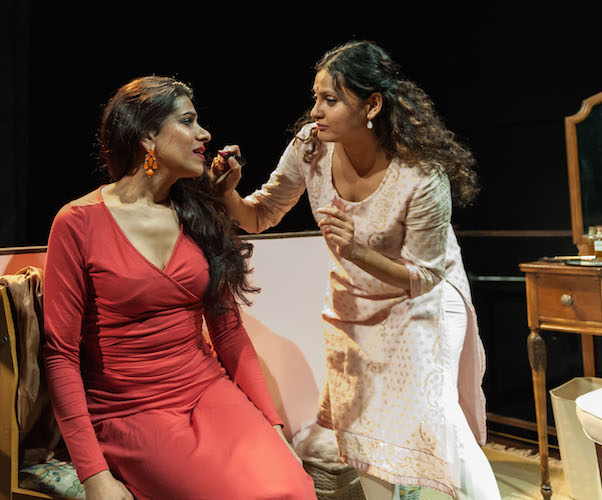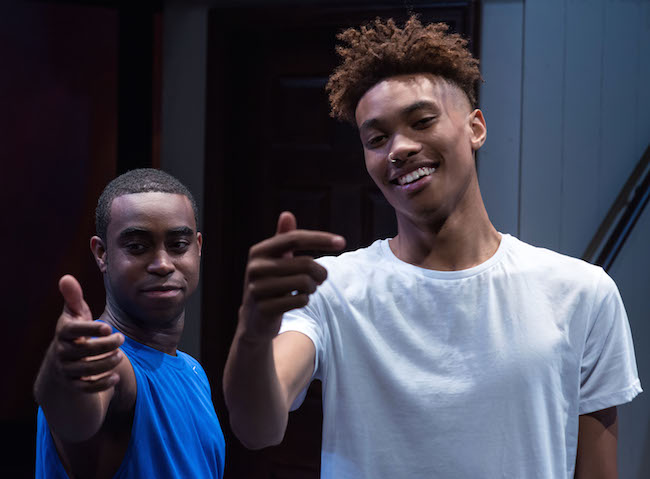Theater Review: “When January Feels Like Summer” — Love and Transformation
The more we learn about Cori Thomas’s characters and their lives, the more we like them and root for them.
When January Feels Like Summer, by Cori Thomas. Directed by Benny Sato Ambush. Scenic design, Janie E. Howland. Costume design, Leslie Held. Lighting design, Jeff Adelberg. Sound design, Dewey Dellay. Underground Railway Theater, Central Square Theater, 450 Massachusetts Ave., Cambridge, MA, through November 13.

Mesma Belsaré & Sanaa Kazi in the Underground Railway Theater production of “When January Feels Like Summer.” Photo: A.R. Sinclair Photography.
By Evelyn Rosenthal
In an election season when the Orange Menace has injected hate and intolerance into the mainstream, Cori Thomas’s When January Feels Like Summer presents a hope-filled alternative to the kind of “othering” that begets bigotry and prejudice. The play asks us to examine our own preconceived ideas about its five characters, as they in turn confront their judgments about each other. Thomas’s lesson doesn’t depend on polemic; it is conveyed through a touching and at times howlingly funny story of love and transformation. And the Underground Railway Theater has put together a winning, thoroughly enjoyable production of her play under the sure directorial hand of Benny Sato Ambush.
It’s January in Harlem, and the weather seems to be playing tricks, one day calling for winter jackets, the next for shorts. Change is also in the air for three African American men—the twentyish Devaun and Jeron, who work at Burger King, and Joe, a sanitation worker—who meet up with Nirmala and Ishan, two siblings originally from India. Ishan, a buttoned-up accountant, is in the process of transitioning to a woman; Nirmala, whose brain-dead husband has lain in the hospital for three years breathing through a machine, runs the family convenience store and agonizes over whether to pull the plug or, at least, move on with her life.
When we first meet them—on a subway car complete with PA announcements and occasional flickers of light—Devaun and Jeron are dishing about women. The tall, lanky Devaun—in a wonderful comic performance by BU theater student Seth Hill—has more female attention than he can handle, and the less experienced Jeron—the solid, endearing Marc Pierre—wants to up his game. There’s more to this perfectly cast odd couple, though, than their low-wage jobs and street banter. The nerdy, smart Jeron dreams of starting a video game company and finding a true love, and the dimmer but charismatic Devaun worries about climate change (or “the global,” as he calls it) and imagines himself making a difference in people’s lives, like Martin Luther King, or “Malcolm, or Superman.” To that end, he takes it upon himself to put up posters warning the neighborhood about Laurence, a local character (one we never see) who he thinks was trying to lure him for sex—“homosexing” him, as he puts it. Ordinarily such a development could portend tragedy—or at least wrenching drama—but Thomas gives it a twist that, while not completely convincing, keeps the play’s focus on the comic. It’s also the device that brings various characters together.
At the convenience store, Ishan has decided to quit his job and finally come out as Indira, the woman he feels he is inside. Indira is the play’s most compelling character, and the terrific Mesma Belsaré conveys all the fear, insecurity, and courage of such a transformation, along with an almost giddy joy at being able to live in the world as her true self. The first person to encounter Indira is Joe, whose reaction to her new identity quickly passes through skepticism and bemusement to matter-of-fact acceptance. A regular customer, he has a thing for Nirmala, but doesn’t know she’s married and that her husband is “a vegetable”—that is, until Indira informs him, along with offering to sign him up as the first client in her new dating service, “Indira’s Love Connection.” David J. Curtis, as the kind, good-natured sanitation worker with a hidden heartache of his own, movingly displays Joe’s strength and tenderness as he coaxes the conflicted Nirmala out of her self-imposed loneliness. Sanaa Kazi is affecting (if a bit muted) as Nirmala, and she and Curtis share a couple of lovely scenes where they inch their way together with the help of ice cream (shades of She Loves Me?) and Al Green’s cover of the Bee Gees’ “How Can You Mend a Broken Heart.”

Marc Pierre & Seth Hill in the Underground Railway Theater production of “When January Feels Like Summer.” Photo: A.R. Sinclair Photography.
For a nonmusical, this production makes excellent use of music. As the scenes alternate between various character pairings, each shift is signaled by a culturally appropriate musical interlude featuring funkified hip-hop beats or Indian melodies and rhythms. Composer and sound designer Dewey Dellay’s work adds texture to the production, subtly reminding us of the boundaries being crossed. Also impressive is Janie E. Howland’s scenic design, which manages to cover a lot of ground in a small space. In addition to the portable subway car and a curtain suggesting the hospital room, the store and three separate apartments are delineated in an ingenious stacked configuration that evokes the dense city neighborhood.
The more we learn about these characters and their lives, the more we like them and root for them. Ladies man Devaun is from a church-going family, and in a hilarious scene where he schools Jeron in how to act with women, he’s sweet and sexy and funny. When the two friends show up at the store and ask Indira if they can put up one of their posters, Devaun is smitten by her beauty, her elegance, her way of calling them “gentlemen.” Thrilled at being seen and pursued as a woman, Indira encourages the flirtation and agrees to go out with him. Still, she wonders, what happens if he wants to make love? Will Devaun—who jumped to a possibly homophobic conclusion about Laurence—reject her? Even hurt her? Or will this pair, like Nirmala and Joe, and even Jeron and his new girlfriend Lucy Ming, overcome the obstacles to happily ever after?
The answer comes in a beautifully written and acted scene featuring Indira, Devaun, and the elephant-headed Hindu deity Ganesha, who presides over new beginnings and removing obstacles. But it’s not magic realism or a deus ex machina that paves the way forward for these appealing characters—it’s their own willingness to be true to who they are and to see through the veil of prejudices and expectations, into each other’s hearts.
Evelyn Rosenthal is the former editor in chief and head of publications at the Harvard Art Museums. She is also a professional singer, specializing in jazz and Brazilian music. She writes about musical theater, music, and books for the Arts Fuse.
Tagged: Benny Sato Ambush, Cori Thomas, Underground Railway Theater
